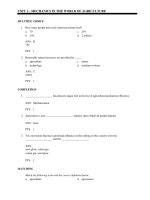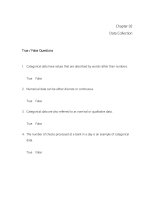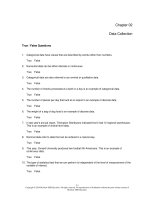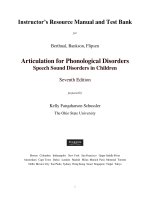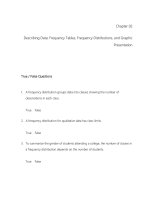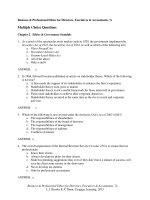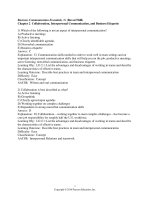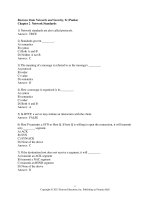Business data communications infrastructure networking and security 7th edition stallings test bank
Bạn đang xem bản rút gọn của tài liệu. Xem và tải ngay bản đầy đủ của tài liệu tại đây (314.4 KB, 5 trang )
Business Data Communications Infrastructure, Networking, and Security, 7th Edition, by
William Stallings and Tom Case
CHAPTER 2: BUSINESS INFORMATION
TRUE OR FALSE
T
F
1. Today, all networked information is sent using digital formats.
T
F
2. A single bit of information represents two states or values.
T
F
3. The terms byte and octet describe the same amount of information.
T
F
4. Voice communication can only be done using an analog signal.
T
F
5. PBX and Centrex systems provide similar functionality from the
users point-of-view.
T
F
6. Services transmitting video information use a series of vector
images to represent moving images.
T
F
7. System response time and system cost are closely related to each
other.
T
F
8. Response time is extremely important when implementing email
systems.
T
F
9. When transmitting video information, compression ratios can
range as high as 100:1 with little loss of perceived quality.
T
F
10. Interlacing is a method of reducing the bandwidth requirements
for video transmissions.
T
F
11. When using analog communications, channel capacity is measured
in hertz (Hz) where 1 Hz equals 1000 oscillations per second.
T
F
12. The United States national version of IRA is referred to as the
American Standard Code for Information Interchange (ASCII).
T
F
13. Common examples of data include text and numerical
information.
T
F
14. Raster graphics involves the use of binary codes to represent
object type, size, and orientation.
T
F
15. The Joint Photographic Experts Group (JPEG) is a collaborative
standards-making effort between ISO and ITU-T.
Business Data Communications Infrastructure, Networking, and Security, 7th Edition, by
William Stallings and Tom Case
MULTIPLE CHOICE
1. Which of the following represents a digital form of information?
A. a gas gauge
B. a fax transmission
C. a watch that displays time as HH:MM
D. a page filled with English prose
2. Which of the following represents the most basic unit of digital information?
A. byte
B. nibble
C. pixel
D. bit
3. Standard voice telephone lines, such as those found in residences, limit
bandwidth to:
4.
5.
6.
A. 300 Hz
B. 3,400 Hz
C. 20,000 Hz
D. 1,410,000 Hz
A stereo compact disc typically requires the bandwidth for each channel to
be:
A. 300 Hz
B. 3,400 Hz
C. 8,000 Hz
D. 20,000 Hz
When using data communications with 8-bit codes, the number of alphabetic
symbols
A. must be exactly 256
B. must be exactly 512
C. can be greater than 1024 bytes
D. must be less than 256
The time interval between when a user presses a key and when the result of
that action arrives at his or her workstation is called the:
A. response time
B. turn-around time
C. think time
D. delay time
Business Data Communications Infrastructure, Networking, and Security, 7th Edition, by
William Stallings and Tom Case
7.
8.
9.
10.
11.
12.
In digital systems, the information rate and the capacity of a digital channel
are measured in:
A. mhz
B. dps
C. bps
D. ghz
Analog information sources include:
A. sounds
B. music
C. video
D. all of the above
Historically, the most commonly used text code is the __________, in which each
character in this code is represented by a unique 7-bit pattern.
A. UTF-8
B. IRA
C. Morse code
D. none of the above
The number of different characters that can be represented in the
International Reference Alphabet text code is:
A. 512
B. 256
C. 128
D. 64
_________ is capable of representing symbols and characters used in all the
major languages spoken around the world.
A. UTF-8
B. ASCII
C. IRA
D. UCST
A ________ is the smallest single component of a digital image.
A. RGB
B. megapixel
C. pixel
D. none of the above
Business Data Communications Infrastructure, Networking, and Security, 7th Edition, by
William Stallings and Tom Case
13.
14.
15.
_________ images are the most common type of image being transmitted over
today’s enterprise networks.
A. Color
B. Black and white
C. Pixilated
D. Grayscale
The most widely used format for raster-scan images is referred to as _______.
A. TIFF
B. JPEG
C. PNG
D. PDF
_________ screens use thin sandwiches of glass containing a liquid-crystal
material to display images.
A. PDF
B. LCD
C. CRT
D. all of the above
SHORT ANSWER
1. A __________ system uses a sequence of discrete, discontinuous values or
symbols to represent information.
2. Nondigital __________ systems use a continuous range of values to represent
Information.
3. With _________ compression receivers can reproduce an exact digital duplicate
of the original audio stream transmitted by the sender by
expanding/decompressing the file that is received.
4. When _________ compression is used, irreversible changes are made to the
original file that diminish the quality of the original audio stream when the
receiver decompresses the file.
5. A _________ is an on-premise telephone switch, owned or leased by an
organization that interconnects the telephones at that location and provides
outside access to the public telephone systems and other voice services.
6. ________ files contain very little formatting and do not support formatting such
as boldface, italics, or underline.
Business Data Communications Infrastructure, Networking, and Security, 7th Edition, by
William Stallings and Tom Case
7. ________ consists of information that can be represented by a finite alphabet of
symbols, such as the numbers 0 through 9 or the symbols represented on a
computer keyboard.
8. Some of the International Reference Alphabet text code patterns represent
invisible, nonprintable characters called __________.
9. The _________ (IRA) character set is the most common format for English
language text files.
10. _________ is a 16-bit code that is backward compatible with IRA/ASCII.
11. The _________ service supports the communication of individual pictures,
charts, or drawings.
12. A representation of images that uses straight and curved line segments is
called ________.
13. A representation of images that uses an array of pixels is called ______.
14. ________ is a page-description language that is built into many desktop
printers and virtually all high-end printing systems.
15. _________ is a subjective measure of the user’s perception of the overall value
of the network application or service.
